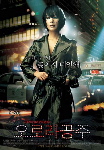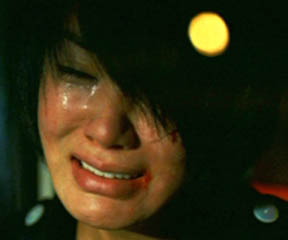| Princess Aurora |
|
THE STORY
A beautiful young woman watches hesitantly as a mother drags a child into the restroom of an apartment store. The little girl is bawling her eyes out, but the mother lectures her regardless and hits her repeatedly, before telling her to clean up and stop crying. As the mother enters one of the stalls, the young woman quietly escort the little girl out of the room. Moments later the young woman returns. She kicks in the door to the mother's stall and stabs her brutally! When the woman has finished her decidedly unsanitary endeavor the walls are covered with blood splatter and the mother lies motionless on the floor with more holes than a pincushion. Then the woman slips quietly out of the restroom again. Later two cops arrive on the scene. The case has been assigned to the righteous detective Oh, who harbors wishes of being a priest, and the younger more reckless detective Jung. Shortly thereafter we discover that the young woman from the opening scene turns out to be the soft-spoken Jung Soon-jung, a hardworking car salesman, who seems to live a quiet uneventful life - except of course when she's out killing people. Next up: An upscale beauty parlor. Soon-jung targets a rich spoiled girl who works in the same dealership as herself. The girl verbally abuses a woman delivering food to the shop, right in front of Soon-jung. When it's time for her weekly beauty treatment Soon-jung intervenes and strangles the poor girl, before she's even had her nails done. Once again Detectives Oh and Jung arrive at the scene and find themselves somewhat perplexed by the crime in front of them. Unaware that these killings are connected the increasingly frustrated police force have little to show for their efforts, and meanwhile more bodies show up. At first it seems as if the killings are just random, but then Detective Oh makes a startling discovery. In one of the crime scenes he finds a little sticker with a picture of the cartoon character Princess Aurora. Further searches reveal a similar sticker at each of the other crime scenes. There IS a connection between the murders. The police is one step closer... THE REVIEW In 1974 Charles Bronson tore up the streets of New York in the vigilante tale "Death Wish". The reason the film worked so well - assuming you agree that it did - was because it connected emotionally with the audience. It took us on a journey, it had a purpose, and we were with our anti-hero every step of the way. We cried when the initial crime was committed, and we cheered every time Bronson brought yet another bum to justice. "Princess Aurora" makes two crucial mistakes. First, the truth behind the killings is kept from us, it's a mystery that we must discover along with the cops. I can see how someone would mistake this for a good idea, but it means that for almost an hour we have no clue why our leading lady is doing what she's doing. We don't know if she's a hero or a villain. Of course we can make an educated guess, but assumption is no substitute for certainty. Second, the film keeps us at an arms length when it comes to the characters. They are sketchy at best, and we learn next to nothing about them along the way, which kind of reminds me of the way the "CSI" and "Law & Order" TV-series operate. The main selling point behind these franchises is that you don't have to watch every single episode to keep up. There's very little background information on the characters, and very few incidents have repercussions that extend beyond the 45 minutes running time of any given episode. The primary focus is the process behind the investigations - hence the term procedural dramas - and that's fine. It's great to watch one of these shows after a hard day at work, when you just can't be bothered with any complex moral issues. However, when I take the time to watch a film I expect more. Especially when the film deals with a beautiful woman with a tortured past who goes on a vigilante killing spree. What's her story? What possible excuse could there be for killing so many innocent people? Answering those questions should make for an interesting film. Unfortunately "Princess Aurora" seems content witch sticking to a simplistic conventional narrative. Jung kills somebody. Then the cops find the body. Then Jung kills somebody else. Then we go back to the cops, and so on. The story is primarily told from Soon-jung's point of view. We follow her calm execution of her victims, but as she moves from one "case" to the next, she shows little enthusiasm for her project. Even as the reason behind the killings is slowly revealed, Jung still seems almost disconnected from her mission. She's so cold and calculated that the film effectively isolates its heroine from the audience. Jung has one single scene of tortured reflection on the past that gives us some idea about what she's going through, but it's simply not enough. We don't have access to her thoughts - how could we? She's alone and never talks to anybody! That might have been okay if the cops and their investigation of the murders had been the focus of the story, instead they're as perfunctory as they come. Detective Oh is the only one we get to know a little bit, when his connection to the case is revealed, but even then the film dodges every opportunity to give us some insight to this man. He doesn't even communicate a whole lot with his partner, leaving Detective Jung to serve as an exposition tool. The problem is that there's literally millions of stories like this on TV. "Princess Aurora" offers the killer's perspective as well, and we usually don't get that on the tube, plus there's more blood than you'd normally see in a TV show - though with the American cable channels trying to top each other in carnage, it's a close call these days - but besides that the film has little to offer that we can't see on TV at any given moment. When we finally get to the showdown - a surreal event that takes places in the midst of a media frenzy - the film's detached attitude towards the events it portrays comes back to haunt it. It's obvious what buttons the film is trying to push when the case comes full circle, but nothing happens. The emotional payoff never comes. It didn't for me anyway. An unfortunate side effect from the detached storytelling, is that the moral implications behind the killings are never covered. The film even goes as far as providing a ludicrous justification for Soon-jung's actions, and that really ruined the film for me. WRAP-UP "Princess Aurora" is not a bad film per se, and I can't even claim that I was bored. It looks beautiful, the actors do a fine job and every scene is perfectly shot and edited. But the way the film wraps up so neatly, without any reflection on the events that transpired, left me with an empty feeling. There were some cool scenes along the way, some blood & mayhem... but now what? What's the punchline? What's the point? Of course, one could argue that every film doesn't necessarily need to have a punchline or even a point, but films that get away with something like that usually present us with a much more elaborate problem, or take place in a much more nuanced world. "Princess Aurora" is a fairly entertaining film, but it's an empty shell. It might be okay to watch as you collapse on the couch after dinner. Though, given the choice I might just go for an episode of "CSI" instead. If not for any other reason than the fact that it's half as long. |
|
David Bjerre
April 2, 2006 |












